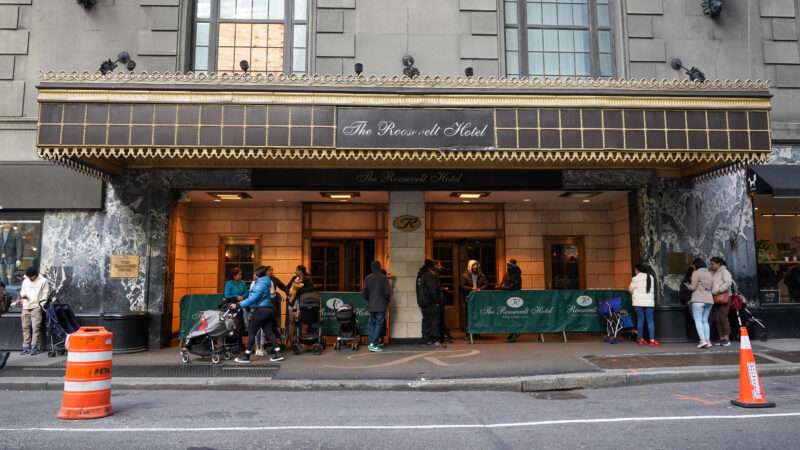
Heavyweight libertarian economist Milton Friedman's famous observation was that you can't have open immigration and a welfare state.
"There is no doubt that free and open immigration is the right policy in a libertarian state, but in a welfare state it is a different story: the supply of immigrants will become infinite," he said. For that reason, he argued illegal immigrants who are legally barred from receiving welfare benefits were preferred to legal, welfare-eligible arrivals.
Recent events seem to be proving him right. Mostly.
Last month, the federal government reported an unprecedented 18 percent increase in the country's homeless population, driven almost entirely by an influx of migrants into big city shelter systems in New York, Massachusetts, Chicago, and Denver.
In the former two jurisdictions, the migrant surge collided with pre-existing "right-to-shelter" policies that require state and local governments to provide a bed to people who ask for one. In the latter two, local policymakers elected to create sprawling new migrant shelter systems.
In all cases, Texas Gov. Greg Abbott has bused tens of thousands of asylum seekers to these locales as a trollish response to their "sanctuary city" status.
Friedman's technical claim that limitless immigration and limitless welfare can't coexist is now seemingly being vindicated.
The U.S. does not have an open borders policy, but those cities and states effectively do to anyone already in the country. Faced with migrant flows they can't control, state and local welfare programs open to those migrants were quickly overtaxed. Unable to build walls around their borders, local and state officials are now moving to build walls around their welfare states.
Chicago is folding its migrant shelter system back into its standard emergency shelter system. New York is closing 25 migrant shelters and winding down its offer of free hotel rooms to migrant families. (At its height, over 10 percent of New York's hotels were being rented by the city to provide rooms for migrants.)
Where Friedman appears wrong is in his claim that limitless immigration will necessarily follow the offer of free welfare benefits.
Even before New York and Massachusetts started rolling back their right-to-shelter policies for migrants, plenty of newly arrived migrants and asylum seekers opted to move to locations where free hotel rooms were not on offer.
Writing for The Atlantic in February, Jerusalem Demsas reported that Los Angeles, Houston, and Miami are all top destinations for asylum seekers.
Per Demsas' reporting, the former two cities are also not experiencing a New York-style "migrant crisis" of urban disorder and endless tent encampments. (Los Angeles, of course, has urban disorder and endless tent encampments but that is a longstanding problem driven by the city's refusal to allow housing construction for native-born Americans and immigrants alike.)
The new federal homeless numbers support this. While New York saw a 54,000-person increase in its homeless population (driven almost entirely by migrants in shelters), Texas and Florida posted homeless increases of a few hundred each.
California also saw no huge surge in homelessness beyond the depressing upward trend line of past years, something Mercatus Center researcher Salim Furth says "suggests that migrants have options better than tents but not as good as shelters."
All that is to say, even without right-to-shelter policies, migrants are managing to find shelter on their own.
Demsas suggests these states already have better systems for integrating migrants from Latin America into everyday life. In Texas and Florida at least, part of that story is likely also just the lower general cost of shelter (itself a product of lower regulation on homebuilding).
The takeaway is that while a rapid influx of immigrants will eventually overtax welfare programs to which they're entitled, this doesn't require us to wait for the welfare state to be abolished in order to have open immigration.
When migrants threaten to exhaust existing welfare programs, politicians will move to restrict eligibility in favor of native-born Americans. Even very poor immigrants are not going to immediately rush to the most generous welfare program around. Absent welfare benefits, plenty are able to integrate into American life without creating a "crisis."
The post 2024's Unprecedented Rise in Homelessness Shows the Tension Between Free Shelter and Free Movement appeared first on Reason.com.







